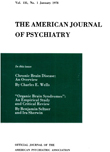BILATERAL ADRENALECTOMY IN CHRONIC SCHIZOPHRENIC PATIENTS: 6 YEARS AFTER
Abstract
1. Four bilaterally adrenalectomized chronic schizophrenic patients have been maintained in good physiological states for 6 years in a state hospital setting. Another patient, continuously hospitalized since 1908, died of carcinomatous spread at age 66, 5 years after the operation. A paranoid psychotic male with cancer of the prostate and metastases was discharged from the hospital 8 months after bilateral adrenalectomy.
2. A generalized, non-specific psychological response to the operation was observed in all patients. For one month, bizarre behavior and preoccupations with delusional material subsided while the previously noted ambivalent tendencies emerged in sharp focus. The period of heightened ambivalence was succeeded by a phase in which 4 patients exhibited a temporary reversal of their usual clinical behavior through abandonment of reaction formations. This sequence of behavior can be reproduced by reducing the cortisone level to near threshold maintenance levels or by providing inadequate amounts of Compounds S, B or F. The sequence is seen in the ordinary clinical course of chronic schizophrenia.
3. Bilateral adrenalectomy does not significantly influence the clinical course of chronic schizophrenic patients nor does the procedure followed by adequate replacement therapy interfere with the potentialities for remissive or reversible states.
4. This study does not differentiate patients for whom certain biological factors are etiologically significant from those for whom psychological events are crucial.
5. The hypothesis: adrenocortical activities are significant etiologically in some schizophrenic patients, is not supported by these observations.
6. The therapeutic efficacy of various and varying combinations of adrenosteroids was not observed.
Access content
To read the fulltext, please use one of the options below to sign in or purchase access.- Personal login
- Institutional Login
- Sign in via OpenAthens
- Register for access
-
Please login/register if you wish to pair your device and check access availability.
Not a subscriber?
PsychiatryOnline subscription options offer access to the DSM-5 library, books, journals, CME, and patient resources. This all-in-one virtual library provides psychiatrists and mental health professionals with key resources for diagnosis, treatment, research, and professional development.
Need more help? PsychiatryOnline Customer Service may be reached by emailing [email protected] or by calling 800-368-5777 (in the U.S.) or 703-907-7322 (outside the U.S.).



